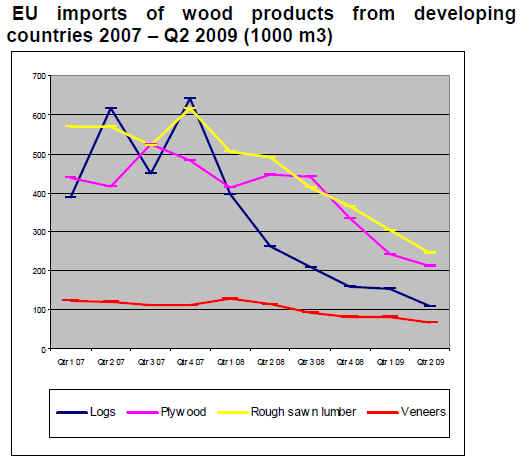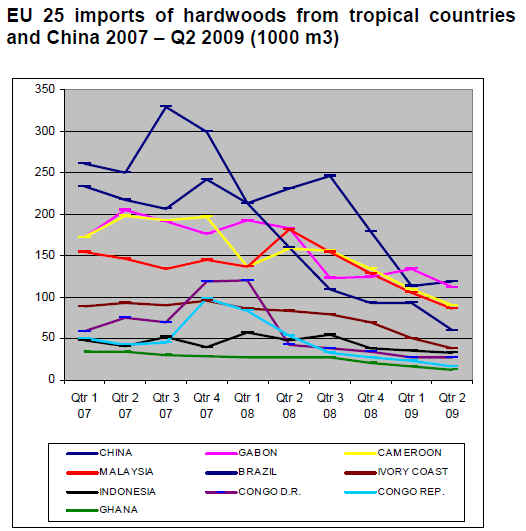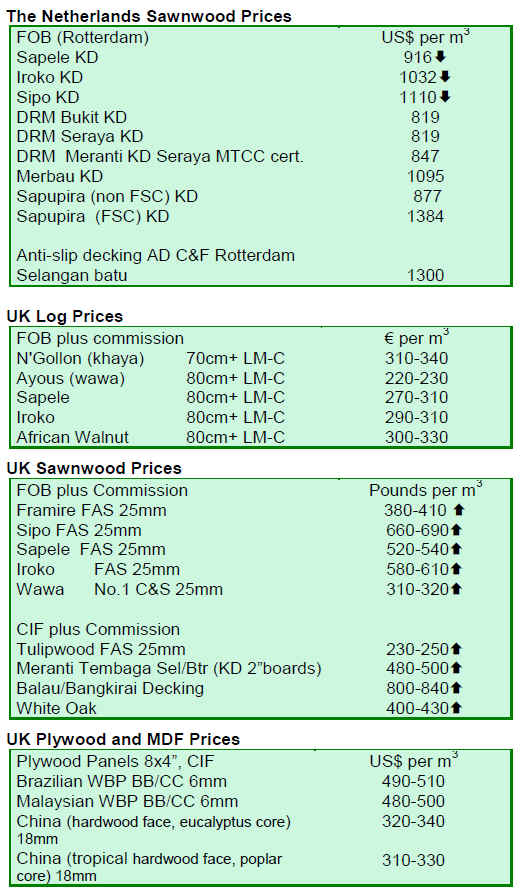|
Report
from
Europe, the UK
and
Russia
Huge fall in imports
The latest European import data shows that the dramatic
fall in EU tropical hardwood imports which began at the
start of 2008, continued into the second quarter of 2009.
Between January and June this year, European imports of
tropical hardwood logs, sawn lumber, veneer and plywood
were down 41%, 45%, 39% and 46% respectively
compared to the same period in 2008. European import
volumes of these commodities in 2009 are a small fraction
of those of only two years earlier.
While it is easy to explain falling imports as a response to
the global economic downturn, such has been the depth of
the decline that serious issues are raised about the extent to
which it might drive long-term structural changes in the
European wood industry that may be generally detrimental
to future prospects for tropical hardwood.
Import downturn continues into the second quarter
The following shows that total EU-25 imports of logs,
plywood, rough sawn lumber and veneers from developing
countries suffered further falls in the April-June period of
this year. The fall in tropical hardwood log imports has
been particularly dramatic.
Total EU-25 imports of these commodity products were
only 109,000 cu.m during the three month period
compared to over 600,000 cu.m during the same period in
2007.

The continuing decline in tropical hardwood imports
during the second quarter of 2009 affected all the major
EU markets. While the data hints that the market decline
may be bottoming out in France, and the UK, imports into
both the Netherlands and Spain experienced further
significant downturns in the April-June period.
All the major tropical hardwood supplying countries to the
EU experienced a decline in sales to the EU during the
second quarter of 2009. Imports from China (mainly
plywood some of which is tropical) showed marginal
gains during the second quarter compared to the first
quarter, although the volumes involved remained well
below those of the previous year.

Highlights of recently released import data
• A 44% decline in imports of tropical hardwood
logs into France, the main EU market for this
commodity, with French imports from Gabon, the
largest supplier falling a massive 43%.
• A 67% decrease in Spanish imports of tropical
sawn lumber, with imports from all the major
tropical supply countries down by well over 50%.
• Of all significant European importers of tropical
hardwood, only Greece seems to have escaped
the turmoil. Greek imports of tropical veneers
were down only 3%. Greek imports of hardwood
plywood from developing countries actually
increased during the period (although most of this
came from China). Greek imports of tropical
sawn lumber (not shown on the charts) also
nearly reached 2008 levels (11,370 m3) at 11,180
m3.
• UK imports of hardwood plywood from
developing countries during January to June 2009
were only half those of the same period the
previous year.
Of all significant tropical hardwood plywood suppliers to
the EU, only Gabon managed to maintain levels close to
those of 2008 this year. Given the huge fall in French log
imports from Gabon, this is clearly indicative of a
continuing shift in manufacturing location for okoume
plywood from France to the African country.
Evidence of structural changes
Some significant structural changes in the European wood
importing industry, which began several years ago, seem
now to be deepening in response to the recession. For
example, dependence on just-in-time ordering of tropical
hardwood goods from large corporations with
concentration yards in the Benelux countries, has
increased. As a result, these companies are becoming
increasingly critical to the long term future of tropical
wood in the EU.
Uncertainty and lack of availability of credit is also
encouraging a move away from any speculative purchases,
and encouraging a shift to products and suppliers which
are regarded as lower risk, usually to the detriment of
tropical wood.
In this environment, there are some signs that the relative
power of larger better capitalised importing companies and
merchants is increasing at the expense of smaller
companies. The larger companies are more likely to
demand environmental certification and to impose other
technical requirements on their suppliers.
This in turn is also encouraging a general shift to low risk
products from an environmental point of view. This is well
illustrated by the recent announcement of a major UK
panel products importer, that it is now sourcing ¡°tropical
hardwood replacement¡± plywood manufactured from
plantation-grown eucalyptus in Uruguay. This is a
worrying sign that some importers are actively avoiding
tropical hardwood to improve their image.
Production competing materials rising
It is also worth highlighting that, while imports of tropical
hardwood have declined dramatically this year, sales and
production of some important competing materials are
actually rising ¨C again because they are perceived to be
lower risk, both in terms of environmental and technical
performance and their ready availability at reasonably
stable (although not necessarily particularly low) prices.
For example, in their latest issue, the German trade journal
EUWID reports that German wood plastic composite
(WPC) manufacturers are continuing to invest in new
capacity.
WPCs are becoming an increasingly important competitor
for tropical hardwoods, particularly in the decking sector
but also for cladding, construction mouldings, and garden
furniture.
EUWID reckons that total European WPC annual capacity
now extends to roughly 120,000 tonnes, while European
imports of WPCs from North America (with capacity now
closer to 1 million tonnes) are also increasing.
In a similar vein, the UK¡¯s TTJ recently reported that UK
sales of thermally-treated and acetylised softwood
products have been rising this year despite the recession.
These products also target tropical hardwood market
niches, such as window frames, decking, cladding,
bridges, and other external applications.
Tropical timber faces a major challenge
The combination of these changes on the demand side, and
the supply side problems emerging from widespread
shutdowns and closures in tropical countries during the
recession, suggests tropical wood suppliers may face a
major challenge to rebound from the current downturn in
the European market even as economic conditions begin to
improve.
Certainly, it will require much larger investments in
marketing, particularly to the architectural and design
profession, product development, and certification, than
has previously been applied by the tropical hardwood
industry. But financing such activities may be particularly
difficult after such a prolonged slump.
If the tropical wood industry is to turn this situation
around it has to find more effective ways of working
together to implement a coherent market access strategy.
There may be some scope to use the EU¡¯s FLEGT VPA
programme as a platform for such a strategy in Europe.
Trade data is derived from Forest Industries Intelligence Industries
analysis of Eurostat and Customs data supplied by BTS Ltd

|